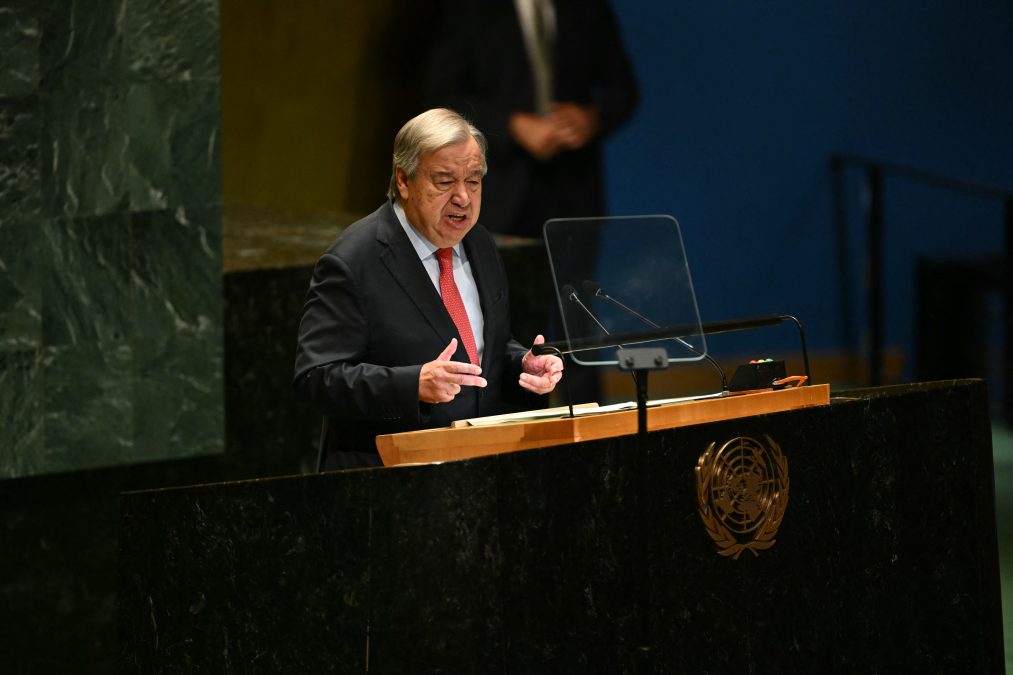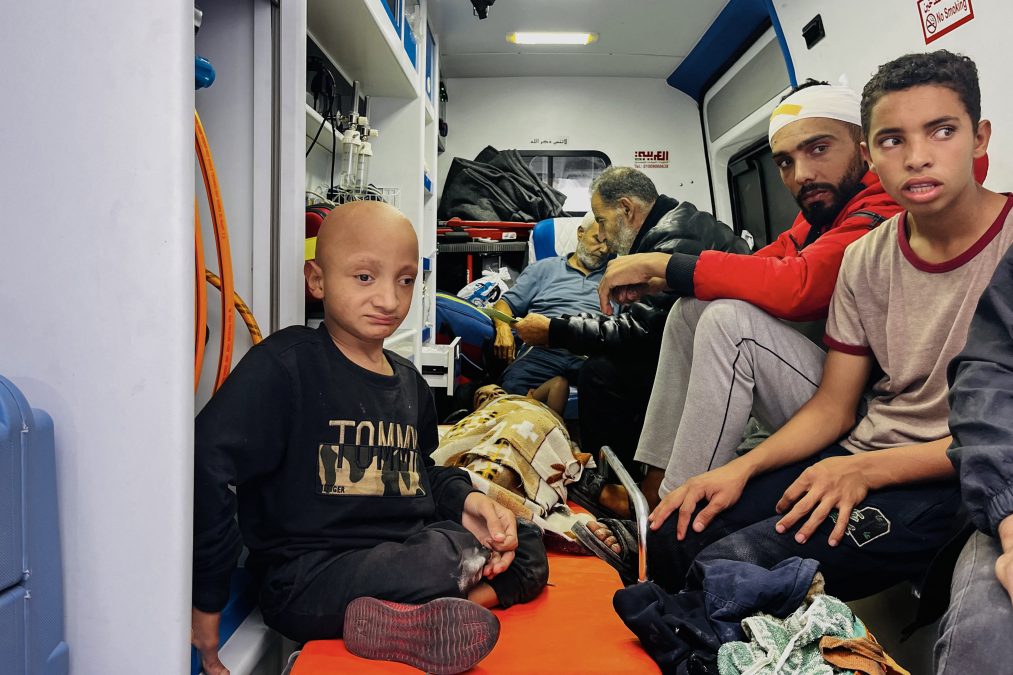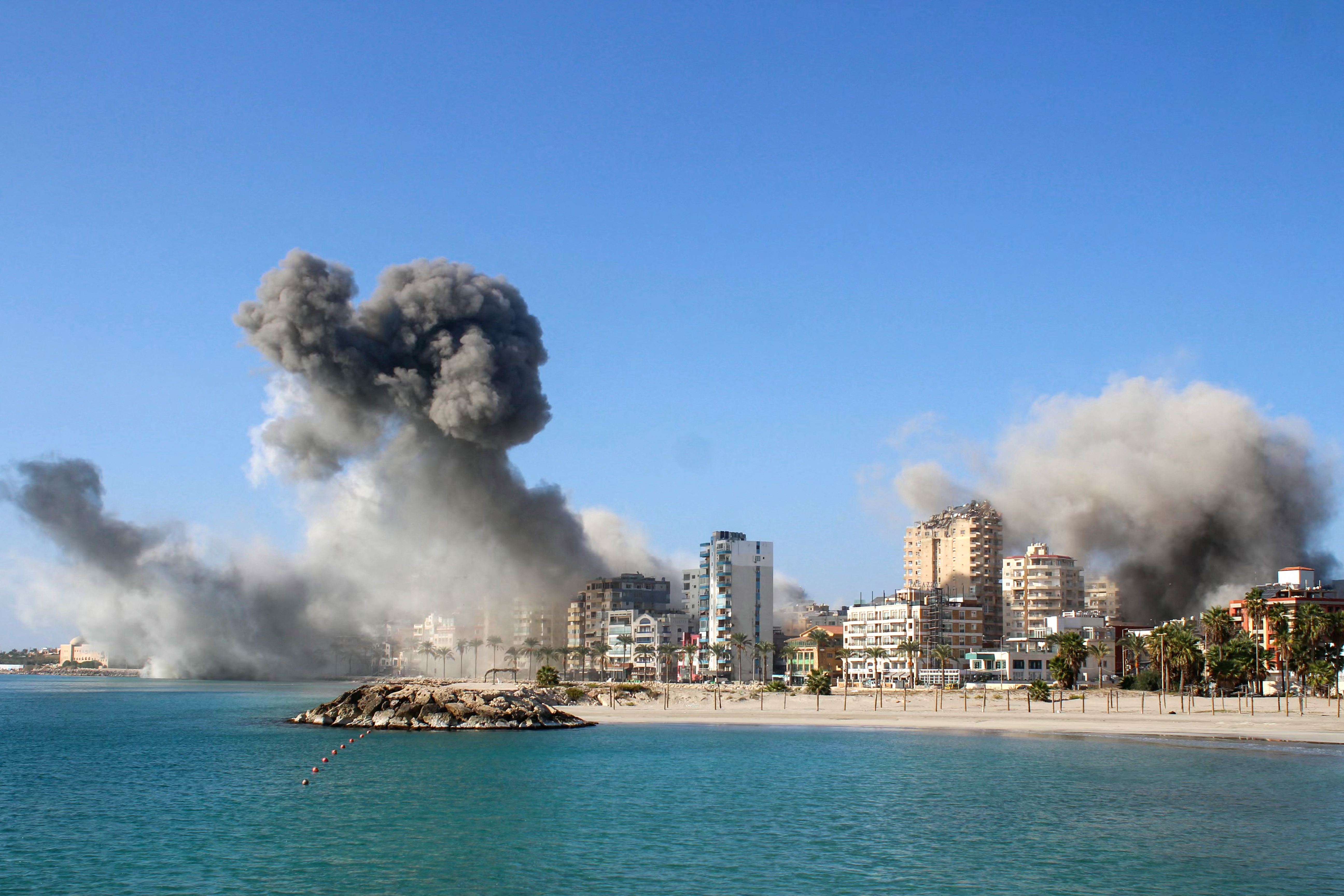Jerusalem/Beirut — Israel’s parliament on Monday approved a bill banning the main UN aid agency in the war-devastated Gaza Strip, sparking international outcry as the government said it was mulling proposed talks with Hamas on a hostage release deal.
Despite objections from the United States and warnings from the UN Security Council, Israeli lawmakers overwhelmingly passed the bill banning the United Nations agency for Palestinian refugees, UNRWA, from working in Israel and occupied east Jerusalem.
Two major developments marked Tuesday as 93 people were killed in Gaza and Hezbollah named Naim Qassem as the group’s new leader.
In Gaza, rescuers pulled bodies from the rubble in Beit Lahia on Tuesday after an overnight Israeli strike that Gaza’s civil defense said killed 93 people in a residential building. Bodies wrapped in shrouds lay in rows as mourners gathered, with witnesses saying many of those killed were women and children. Around 40 people remained missing under the debris, the civil defense agency said.
In Beirut, Lebanon’s Hezbollah movement announced Tuesday it has chosen deputy head Naim Qassem to succeed Hassan Nasrallah as leader after his death in an Israeli strike on south Beirut last month. “Hezbollah’s (governing) Shura Council agreed to elect… Sheikh Naim Qassem as secretary general of Hezbollah,” the Iran-backed group said in a statement, more than a month after Nasrallah’s killing. Hezbollah pledged to keep “the flame of resistance burning” until victory is achieved against Israel after an all-out war erupted on September 23.
Israel quickly hit back, with Defence Minister Yoav Gallant warning in a post on X that Qassem’s appointment was “not for long”.In a separate social media post in Hebrew, Gallant wrote that the “countdown has begun”.
About the Israeli ban on the United Nations, UNRWA has provided essential aid, schooling, healthcare and assistance across the Palestinian territories and to Palestinian refugees elsewhere for more than seven decades.
“There is a deep connection between the terrorist organization (Hamas) and UNRWA and Israel cannot put up with it,” Yuli Edelstein, one of the lawmakers who sponsored the bill, claimed in parliament as he presented the proposal.
Palestinian group Hamas, locked in conflict with Israel in Gaza, called the bill an act of “Zionist aggression” towards Palestinians, while its ally Islamic Jihad described the ban as “an escalation in the genocide”.
Even several of Israel’s staunch Western allies voiced disquiet at the ban, with UK Prime Minister Keir Starmer saying Britain was “gravely concerned”.
Germany — which has made Israel’s security among its reasons of state — warned it would “effectively make UNRWA’s work in Gaza, the West Bank and east Jerusalem impossible… jeopardizing vital humanitarian aid for millions of people”.
UNRWA chief Philippe Lazzarini called the ban part of “an ongoing campaign to discredit the agency” that “will only deepen the suffering of Palestinians”.
Prime Minister Benjamin Netanyahu said on social media that Israel was “ready” to continue providing aid to Gaza “in a way that does not threaten Israel’s security”.
The ban comes as fighting rages in Gaza and Lebanon, where a second full-scale war front opened last month.
Earlier Monday, Netanyahu’s office said Mossad intelligence chief David Barnea had met US and Qatari mediators in Doha, where they agreed they should talk to Hamas about a deal to free Israelis seized in last year’s October 7 attack by Palestinian militants.
“In the coming days, discussions will continue between the mediators and Hamas to assess the feasibility of talks and to further efforts to promote a deal,” Netanyahu’s office said.
The statement came two days after Egypt’s President Abdel Fattah al-Sisi proposed a two-day truce and limited hostage-prisoner exchange that he said could lead to a permanent ceasefire.
But Netanyahu later said he had not received the Egyptian proposal.
Asked about the possibility of a Gaza ceasefire, US President Joe Biden said: “We need a ceasefire. We should end this war. It should end, it should end, it should end.”
After the October 7 attack by Hamas, the Israeli military launched a massive offensive in Gaza to root out Hamas.
Israel has killed the Islamist group’s top leadership, but the war has left tens of thousands of Palestinians dead and driven almost all Gazans from their homes, reducing much of the territory’s infrastructure to rubble.
During the October 7 attack, Palestinian militants seized 251 hostages, including soldiers and civilians, of whom 97 are still in Gaza. The Israeli ministry says 34 of these are dead.
Netanyahu’s government is under mounting pressure from both hostage families and the international community to agree a ceasefire to allow the rest to come home.
Under the plan announced by Sisi, “four hostages would be exchanged for some prisoners in Israeli jails”, followed by more negotiations within 10 days aiming to secure “a complete ceasefire and the entry of aid” into Gaza.
ATTACKS ON GAZA AND LEBANON
In Gaza, rescuers reported fresh strikes on Monday, while the Israeli military said it hit Jabalia refugee camp, in the north, killing dozens of militants.
Since October 6, the military has been carrying out a fresh air and ground assault in north Gaza to destroy operational capabilities it says Hamas is trying to rebuild there.
An Israeli military official, briefing reporters on condition of anonymity, said the goal was to clear Jabalia of militants, which “will take us at least (several) weeks” to achieve.
The official said Israel was not forcing residents to leave, claiming that “the safer zone in the Gaza Strip is in the south, but it’s up to them” to decide whether to go.
But the process has left 100,000 people trapped in a “siege”, Gaza civil defense agency’s spokesman, Mahmud Bassal said late Sunday.
“For 22 days, not a drop of water or bread has entered the northern Gaza Strip,” Bassal said in a statement.
In Beirut, Lebanon’s health ministry said at least 60 people were killed on Monday in Israeli raids on several areas in the eastern Bekaa Valley, most of them in the Baalbek region.
The health ministry said the tolls covered 12 areas in the Bekaa Valley where the militant group Hezbollah holds sway. At least two children were among the dead, it said.
At least 58 others were wounded, the health ministry added, noting that the toll was preliminary as rescue efforts were still underway.
Of the 60 killed, at least 16 deaths were recorded in Al-Alaq, west of Baalbek city, according to the health ministry.

Monday’s deaths raise the overall toll to more than 1,700 killed in Lebanon since the Israel-Hezbollah war erupted late last month, according to an AFP tally of health ministry figures.
The real number is likely to be higher due to gaps in the data.
Baalbek governor Bachir Khodr decried what he called the “most violent” raids on the area since the start of the conflict.
Baalbek is an impoverished region in the Bekaa Valley that borders Syria.
The heavy strikes there on Monday were not preceded by an evacuation warning.
They came as Israel pounded south Lebanon, including the coastal city of Tyre, according to the official National News Agency.
The Israel-Hezbollah war erupted on September 23 after nearly a year of cross-border fire between the two rivals.
The war has displaced at least 1.3 million people, more than 800,000 inside Lebanon according to the UN’s migration agency.
More than half a million people have crossed into Syria, according to Lebanese authorities, most of them Syrians.
ISRAEL AND IRAN TRADE ALLEGATIONS
Israel and Iran accused each other Monday of endangering Middle East peace, in a heated exchange at a UN meeting called after Israel attacked Iranian military targets.
On Saturday, Israel carried out air strikes on military sites in Iran in response to Tehran’s October 1 missile barrage on Israel. The latter was in retaliation for the killing of Iran-backed militant leaders and a Revolutionary Guards commander.
At a meeting of the UN Security Council that was requested by Iran, each country asserted its right to self-defense.
“Israeli aggression against Iran is obvious and does not occur in isolation. This aggressive attack is part of a broader, sustained pattern of aggression and unchecked impunity with which Israel continues to destabilize the entire region,” Iran’s ambassador Amir Saeid Iravani told the council.
He added that Israel’s “persistent and systematic violation of international law,” and military engagements in the Palestinian territories, Lebanon, Syria, and Yemen should spark “unequivocal condemnation” by the council.

The ambassador repeated Iran’s threat to retaliate after Israel’s weekend air strikes, but said Tehran preferred diplomacy.
Israeli ambassador Danny Danon said his country had defended itself after the October 1 missile attacks by Iran.
“We promised that their actions would not go unanswered,” said Danon.
“Iran has seeded violence, chaos and destruction throughout the Middle East. But this violence is not limited to Israel’s borders. It threatens regional stability, global security and economic stability,” the ambassador said.
“Today, it is us. It is Israel at their crossroads. But tomorrow, it could be any of the nations represented here. Don’t be mistaken,” Danon said, calling for strong sanctions against Iran, especially to keep it from developing nuclear weapons.
The United States defended its ally Israel.
“Our message for Iran remains clear, as well: should it choose to undertake further aggressive acts against Israel or US personnel in the region, there will be severe consequences,” US ambassador Linda Thomas-Greenfield told the meeting.
“We will not hesitate to act in self defense,” she said, adding however that the United States wants to avoid escalation.








